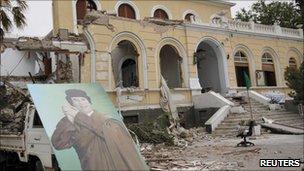Why war effort to oust Gaddafi has few options remaining
- Published
- comments
Now that Britain and France have started launching attack helicopter missions against Libyan loyalist forces, they are hoping the regime may crumble quickly.
In some ways it is surprising that Colonel Gaddafi has not already fled the country, given the months of airstrikes his supporters have already endured.

A government building in Tripoli said to have been damaged by coalition air strikes
However, a study of similar recent uses of power shows why this campaign is proving to be so difficult.
At first sight the similarities between what Nato is trying to achieve in Libya and the campaign it launched against Yugoslavia in 1999 are striking. Both actions started with the use of ground forces ruled out, saw escalating airstrikes, the indictment of the enemy leader for war crimes, and when hope of a quick solution by airpower faded, the dispatch of attack helicopters to the theatre.
In the case of Yugoslavia, a 78-day bombing campaign was eventually crowned with success. The ingredients can be debated but they included escalating Nato airstrikes to the very margins of what might be considered war crimes by targeting civilian infrastructure; a more limited war aim (getting Slobodan Milosevic's forces out of Kosovo rather than forcing him from office); and the knowledge on the part of the Serbian leader that he could lose that disputed province without losing power and therefore his sanctuary from trial.
Of course, Mr Milosevic had to stand down eventually, and a subsequent Serbian leader delivered him up to the war crimes tribunal in the Hague. But the point remains that at the time he abandoned Kosovo, he could reasonably have expected to remain at liberty.
The Gulf War of 1991 was similar in some respects in that its aims were to evict Saddam Hussein's troops from Kuwait and damage their capability so much that they would cease to be a threat to the region.
Of course power was applied in that instance on a far larger scale - both during the conflict and afterwards with an intrusive system of United Nations inspections to disarm Iraq.
However, the point of similarity with Kosovo, was that giving in did not require Saddam to relinquish power altogether. It is the knowledge that there is no way of holding on to his position and that it is highly unlikely that he could avoid war crimes charges that makes it so hard for Gaddafi and the people closest to him to get out.
The generals' mantra that it always takes 'boots on the ground' is not born out by the experience of Kosovo or even Kuwait. While huge ground forces were assembled in 1991, Iraq had, in fact, ordered its withdrawal before the ground war started and its military power been shattered by air power alone. The need for ground forces in the post-conflict phase is a different question.
What is clear though is that conducting an operation like Libya without a ground invasion can take a long time and require the escalation of force to very high levels. It is open to question that the UK and France can inflict that level of pain on Col Gaddafi.
Questions are being asked by some diplomats over whether the war crimes indictments against the Libyan leader and his inner circle have left him with no choice but to fight until the bitter end.
Negotiations to end the conflict now centre on the issue of where these people might go in order to escape the international court.
If these talks do not produce solutions and elements of the Libyan security forces do not unilaterally move against Col Gaddafi, then the only remaining options will be to carry on bombing regardless, or to convince the US that it must commit its forces to a significant escalation of that campaign.